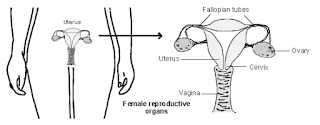Understanding typical early pregnancy
An egg (ovum) is discharged from an ovary into a Fallopian tube. This is called ovulation and as a rule happens once every month about somewhere between periods. Sperm can get by in the Fallopian tubes for up to five days in the wake of having intercourse. A sperm may then consolidate with the ovum (treatment) to make a fetus. The minor developing life is cleared along a Fallopian tube to the womb (uterus) by little hairs (cilia). It typically connects to within coating of the uterus and forms into a child.
Where does an ectopic pregnancy develop?
Most ectopic pregnancies occur when a fertilised egg (ovum) attaches to the inside lining of a Fallopian tube (a tubal ectopic pregnancy). Rarely, an ectopic pregnancy occurs in other places such as in the ovary or inside the tummy (abdomen). The rest of this leaflet deals only with tubal ectopic pregnancy.What are the symptoms of an ectopic pregnancy?
Symptoms typically develop around the sixth week of pregnancy. This is about two weeks after a missed period if you have regular periods. However, symptoms may develop at any time between 4 and 10 weeks of pregnancy. You may not be aware that you are pregnant. For example, your periods may not be regular, or you may be using contraception and not realise it has failed. Symptoms can also start about the time a period is due. At first you may think the symptoms are just a late period.Symptoms include one or more of the following.
- Pain on one side of the lower tummy (abdomen). It may develop sharply, or may slowly get worse over several days. It can become severe.
- Vaginal bleeding often occurs but not always. It is often different to the bleeding of a period. For example, the bleeding may be heavier or lighter than a normal period. The blood may look darker. However, you may think the bleeding is a late period.
- Other symptoms may occur such as diarrhoea, feeling faint, or pain on passing poo (faeces).
- Shoulder-tip pain may develop. This is due to some blood leaking into the abdomen and irritating the muscle used to breathe (the diaphragm).
- If the Fallopian tube ruptures and causes internal bleeding, you may develop severe pain or 'collapse'. This is an emergency as the bleeding is heavy.
- Sometimes there are no warning symptoms (such as pain) before the tube ruptures. Therefore, collapse due to sudden heavy internal bleeding is occasionally the first sign of an ectopic pregnancy.


No comments:
Post a Comment